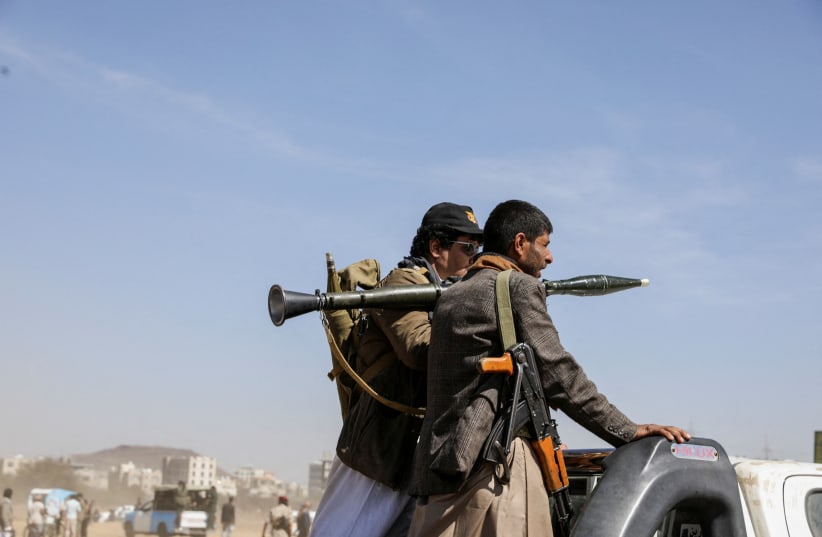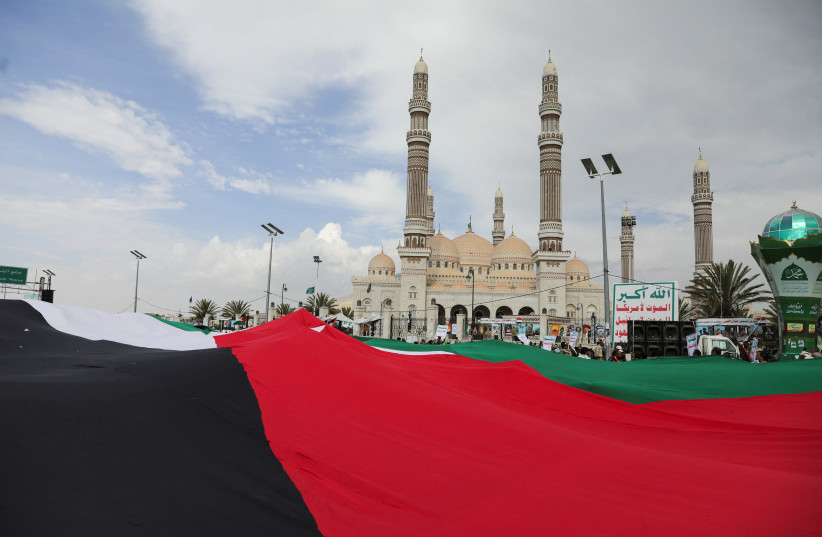Thousands of civilians and business owners in areas controlled by the Houthis are forced to pay levies, exacerbating Yemen's precarious economic situation.
Civilians, shop owners, and emerging companies must pay hefty sums under various pretexts, including zakat (Islamic alms), taxes, and support for the Houthis' military efforts and "military industries." These demands arise amid dire economic conditions and an unprecedented decline in civilian purchasing power.
For more stories from The Media Line, go to themedialine.org.
Bilal Al-Sanani, a Sanaa resident, expressed his concerns on Facebook, calling the economic situation "lethal."
In his post, Al-Sanani explained how the downturn impacts businesses, companies, and emerging projects. Everyone suffers from reduced purchasing power, focusing solely on securing basic survival needs: food and drink.
“The state [the Houthis] is not concerned with civilians at all,” Al-Sanani wrote.
Similarly, Mohammed Hezam, a fabric and textile shop owner in a Houthi-controlled area, speaking to The Media Line about the levies, asked, "What do they want from us? Should I sell my kidney to pay taxes?"
Many people interviewed by The Media Line shared the sentiment that the holy month of Ramadan, which began on March 10, has revealed the people’s weakened purchasing power. Although businesses traditionally see Ramadan as a chance to sell merchandise and cover yearly expenses, the economic condition of Yemenis hinders this goal.
Citizens mainly blame the loss of purchasing power on the Houthis' economic mismanagement in their territories and prioritizing military operations over civilian economic welfare. Some think the economic crisis might erode support for the Houthis, potentially ending their reign.
Management of economic affairs a ‘disaster’
Numerous civilians in Sanaa face challenging economic conditions similar to those described by Bilal Al-Sanani and Mohammed Hezam, with many Houthi supporters deeming the group's economic management a failure. A Media Line survey reveals that most public and private sector employees see the Houthis' engagement in the Palestinian-Israeli conflict as a way to dodge economic responsibilities. Previously, the Houthis blamed the war with Saudi Arabia and the closure of the Hudaydah seaport, now reopened, for the failing economy.
Abdulaziz Al-Dhahabani, a bank employee in Houthi-controlled territory, informed The Media Line that the economic crisis has "worsened" under Houthi leadership. Al-Dhahabani criticizes the Houthis for prioritizing their military operations and private interests over the welfare of the people.
“Imagine that the Houthis blocked traders and individuals from accessing their funds in banks and froze these amounts for the benefit of the Houthis,” he said. “Many banks, institutions, and companies are on the verge of bankruptcy, posing an economic catastrophe by all standards.”
A Houthi-affiliated economy
Since taking control of Sanaa and its financial institutions, the Houthis have failed to bring prosperity to Yemen. Instead, they have exploited economic resources for their and their affiliates' benefit, creating a significant economic gap and causing the Yemeni rial's exchange rate against the US dollar to skyrocket.
In 2016, the Central Bank of Yemen (CBY) was relocated to the internationally recognized provisional capital, Aden, under the control of the internationally recognized government.
Economic expert Ahmed Al-Haddad reported to The Media Line that, despite significant revenue from telecommunications, taxes, customs duties, and other sources, the Houthis have since refused to pay government salaries.
The Houthis persist in monopolizing these revenues for their military operations, causing economic stagnation and diminishing civilians' purchasing power.
Al-Haddad characterized the civilians’ economic situation as “indescribably difficult,” citing instances of families scavenging for food in garbage bins, university professors resorting to begging, and some working in jobs earning less than $100 monthly. In contrast, he said, some Houthi leaders live luxuriously in villas.
Staggering figures of imposed levies
The Media Line communicated with a source from the Houthis' Joint Economic Committee. The source, who spoke on the condition of anonymity for security reasons, shed light on the deliberate economic crisis engineered by the Houthis. “Since the Houthis seized control of Sanaa, they sought to control the CBY and its assets,” the source said.
“The Houthis forcefully imposed taxes on companies and institutions, including those exempted from such fees, demanding taxes for previous and future years,” added the same source.
The source revealed that the Houthis dismissed all economic solutions from previous peace talks and those proposed by the internationally recognized government and the United Nations.
Since the Houthis took control of Sanaa, Yemenis have been suffering from what the United Nations describes as the worst humanitarian crisis, with widespread poverty and unemployment.
The source confirmed reliable information shows the Houthis' annual revenues surpass 300 billion Yemeni rials (approximately $1.2 billion) from taxes, telecommunications, the oil sector, and public enterprises.
He said that the assets, many of which are acquired illegally, are used to support the military sector and arm the group’s affiliates.
“Anything beyond that, the Houthis contribute nothing and systematically work to starve the people,” the source said. “This year’s Ramadan revealed the extent of poverty and famine experienced by Yemenis, while the group boasts about its military operations and support for Palestine.”
A significant portion of Yemenis rely on scarce humanitarian aid and cash transfers from relatives living abroad.
Yemenis had hoped peace talks would resolve the economic crisis, yet Houthi military actions in the Red Sea and Arabian Sea have indefinitely delayed these negotiations, crushing hopes for prompt economic relief.

